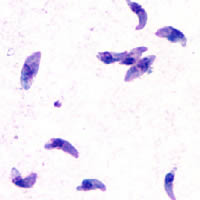 I've written before on this blog about the fascinating case of Toxoplasma gondii infections being able to shape not only the personality of its host, but also, through varying rates in different parts of the world, influence the shape of entire cultures. Today, David Brin's blog referred to another article about this research, which clarified a few points and made it seem even more startling and amazing.
I've written before on this blog about the fascinating case of Toxoplasma gondii infections being able to shape not only the personality of its host, but also, through varying rates in different parts of the world, influence the shape of entire cultures. Today, David Brin's blog referred to another article about this research, which clarified a few points and made it seem even more startling and amazing.Toxoplasma gondii reproduces only in cats, but is carried in many other creatures. One noteworthy thing about it that has been known for a while is that, when it's found in mice and rats, it changes their behaviour, making them less fearful of felines and even in some cases attracted to them. This makes the rodents get eaten, and that in turn gives the parasite the chance to reproduce. This is a perfect example of Richard Dawkins's idea of the extended phenotype: a genetic adaptation, as it works towards the survival of genes, not organisms, may have its effects well beyond the boundaries of a particular organism. (Though in cases like this where it's a damaging parasitical effect, it's easier to see. The really slippery ones for Dawkins to convince us of are ones where it's neither beneficial nor harmful.)
This new article points out a few more interesting conclusions related to individual personality effects which remind me of another point I made on my blog a long time ago:
- Infected men tended to have lower levels of intelligence, superego strength, and novelty-seeking.
- Infected women exhibited higher levels of intelligence, superego strength, and warmth.
- Infected people of both sexes tend to be susceptible to feelings of guilt.
- Infected men are scored as more dominant and more masculine by female observers.
- how "neurotic" a culture is
- whether it prefers stricter or looser laws
- whether it values avoiding uncertainty
- whether it values competitiveness and financial success over cooperation and relationship building


 RealTime and RTC
RealTime and RTC Prism
Prism Uncreated
Uncreated Bloodweavers
Bloodweavers Foulspawner's Legacy
Foulspawner's Legacy Lusternia
Lusternia
No comments:
Post a Comment